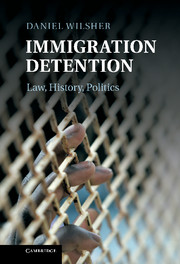Book contents
- Frontmatter
- Contents
- Acknowledgements
- Introduction and overview: free movement of persons and liberty of the person
- 1 The creation of immigration detention: from free movement to regulated borders in America and the United Kingdom
- 2 Modern immigration detention and the rise of the permanent bureaucratic enterprise
- 3 International law and immigration detention: between territorial sovereignty and emerging human rights norms
- 4 Negotiating detention within the European Union: redefining friends and enemies
- 5 Security and immigration detention: the problem of internment in peacetime
- 6 Global migration and the politics of immigration detention
- 7 Restoring the rule of law and influencing politics: placing boundaries around detention
- Bibliography
- Index
- References
Introduction and overview: free movement of persons and liberty of the person
Published online by Cambridge University Press: 05 November 2011
- Frontmatter
- Contents
- Acknowledgements
- Introduction and overview: free movement of persons and liberty of the person
- 1 The creation of immigration detention: from free movement to regulated borders in America and the United Kingdom
- 2 Modern immigration detention and the rise of the permanent bureaucratic enterprise
- 3 International law and immigration detention: between territorial sovereignty and emerging human rights norms
- 4 Negotiating detention within the European Union: redefining friends and enemies
- 5 Security and immigration detention: the problem of internment in peacetime
- 6 Global migration and the politics of immigration detention
- 7 Restoring the rule of law and influencing politics: placing boundaries around detention
- Bibliography
- Index
- References
Summary
The detention of foreigners under the auspices of immigration powers has grown enormously in both its scope and scale during the last thirty years. In a pattern repeated throughout developed nations, and increasingly copied by others, unauthorized or rejected foreigners are being held in prison-like facilities for extended periods without serious legal controls or accountability. The causes of this rise in immigration-related detention are many, but the results are clear; imprisonment of individuals without the normal due process safeguards commonly demanded in liberal democracies is now taking place on a vast scale. This process of ‘warehousing’ immigrants, outside the mainstream of the law, has entailed much that is arbitrary or inhumane. We can see this as part of a more general trend towards ‘politicizing’ the treatment of unauthorized migrants. This book is an attempt to explain the historical development of this phenomenon and to explore the underlying legal and political challenges that it exposes for societies ostensibly committed to a public policy based upon liberal reason and the rule of law.
From free movement to border controls: the alien as liberal subject in the nineteenth century
The ‘alien’ was not always so alien. The impetus towards free trade that prevailed during most of the nineteenth century encompassed labour migration. For a time, the development of liberal principles of economics and constitutionalism marched together to enhance the status of aliens. The increasing recognition of equality to act on the market, stripping away old restrictions based upon privileges and status, extended to aliens’ protection within the economic order of liberalized economies.
- Type
- Chapter
- Information
- Immigration DetentionLaw, History, Politics, pp. ix - xxivPublisher: Cambridge University PressPrint publication year: 2011



